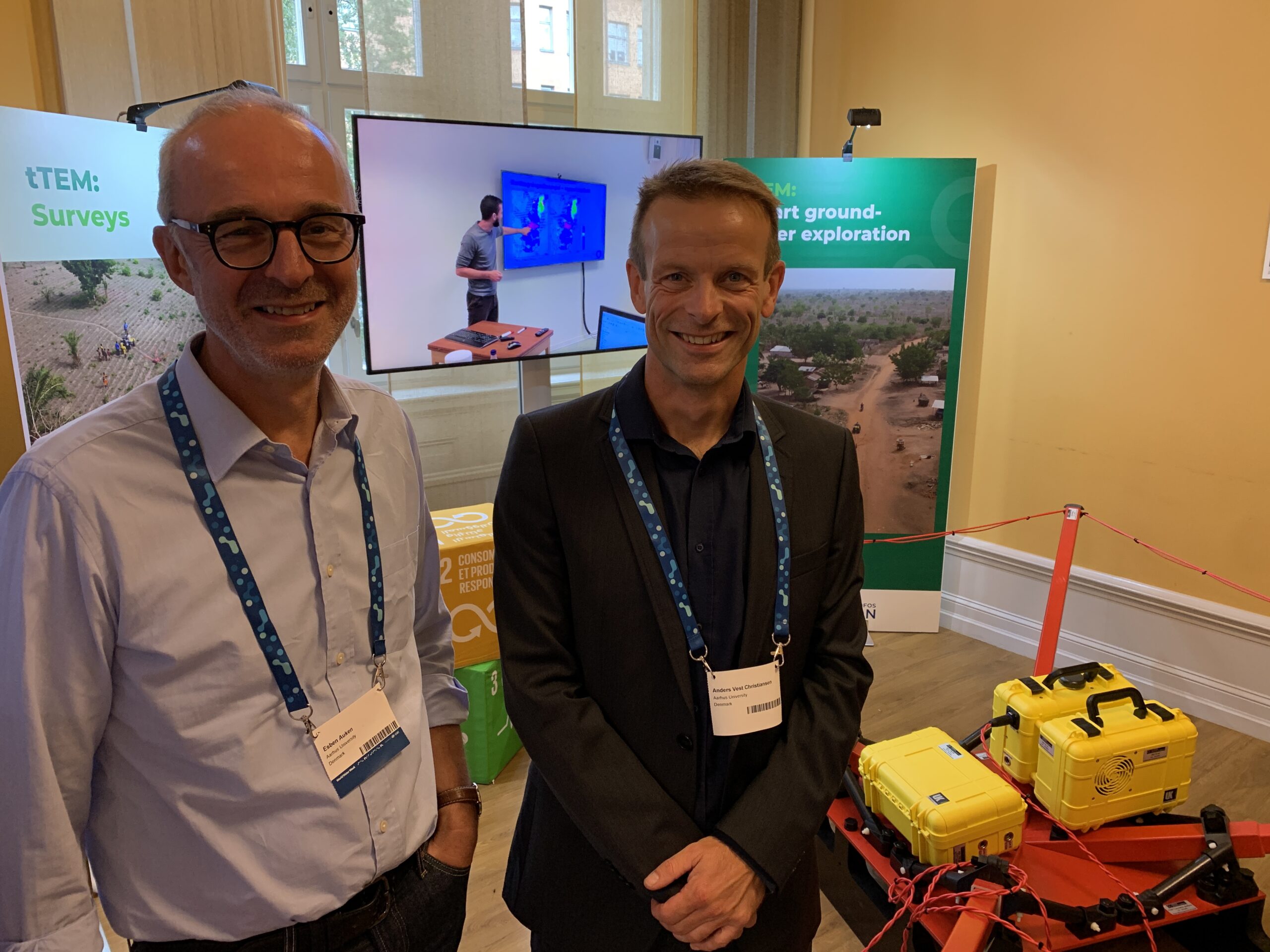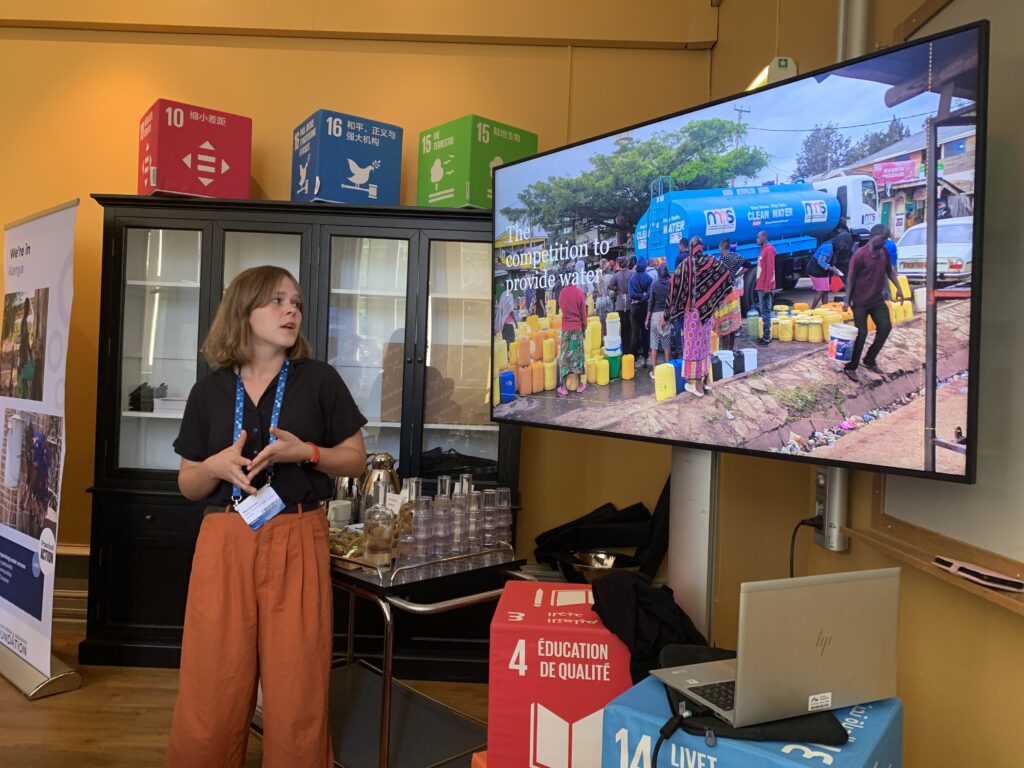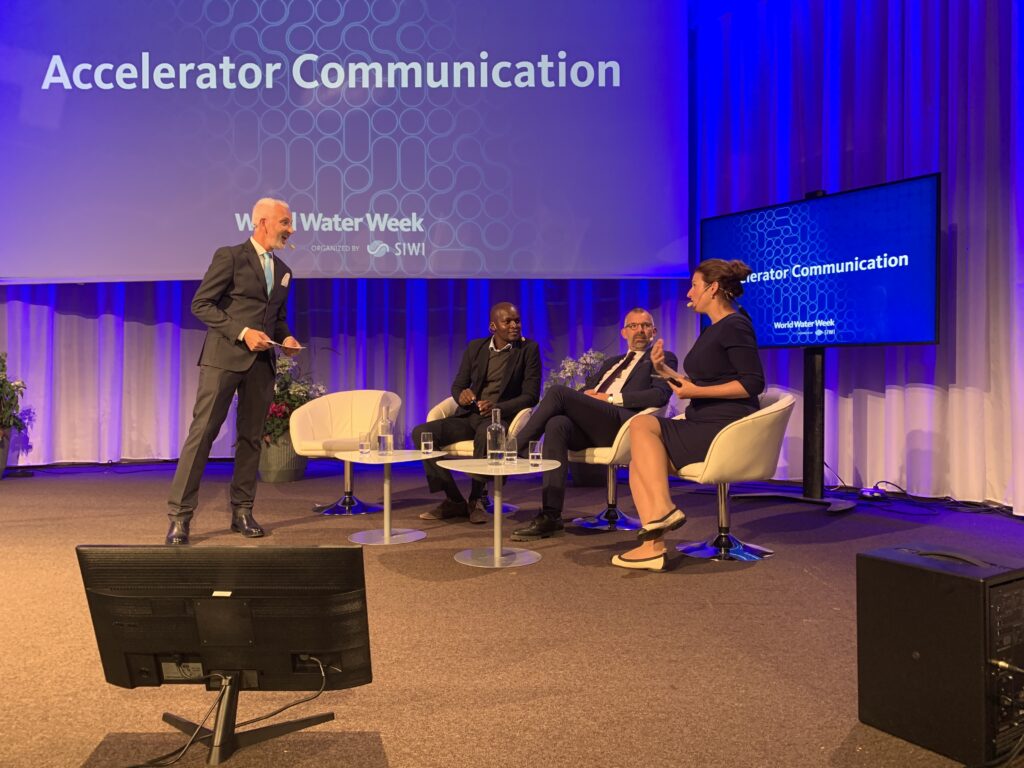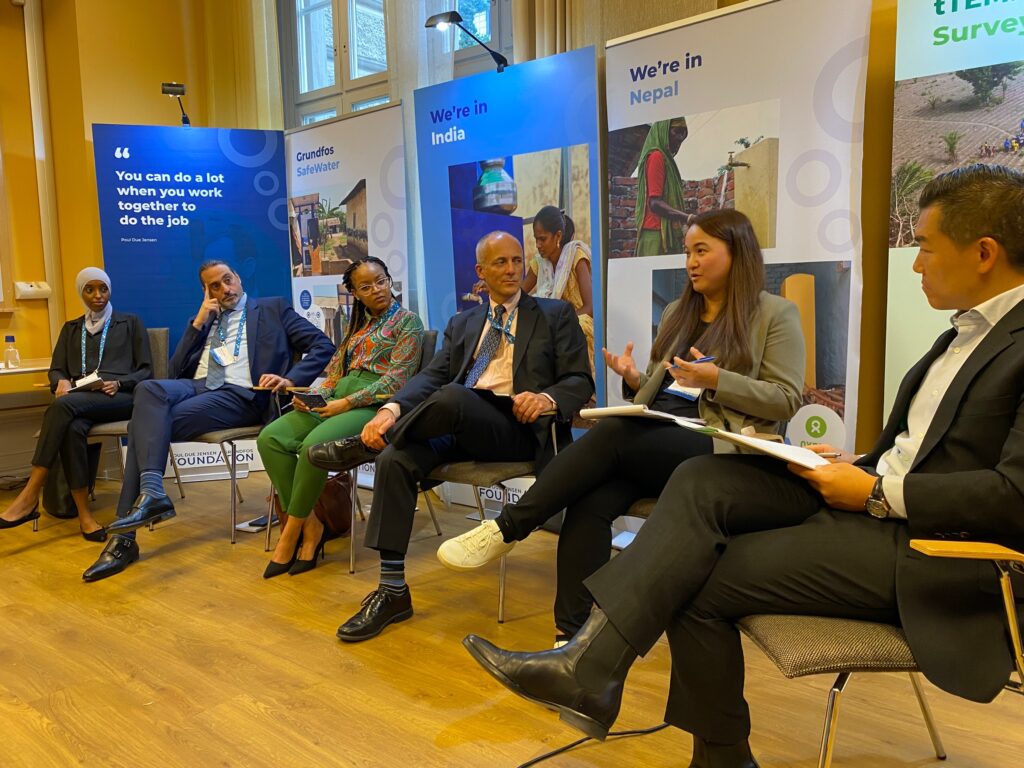At the 2022 World Water Week, the Foundation hosted an exhibition for the first time, and what a week it was. Joined by University and NGO partners from Practical Action as well as colleagues from Grundfos Sustainability, SafeWater and Group Communications, the event provided plenty of opportunity to learn and network. Here are a few of our standout engagements.
Reaching new audiences
Professors Esben Auken and Anders Vest Christiansen of Aarhus University’s HydroGeophysics Group attended the World Water Week as part of the Foundation’s exhibition, where we had put a tTEM system for smart groundwater exploration on display. Both academics were very excited to participate as the event exposed the technology to new audiences.
“At World Water Week, we’ve spoken to NGOs, policymakers, and donors from all over the world, and all of them were very curious to learn more about the technology and the potential to use it in their work,” says Anders Vest Christiansen.
His colleague Esben Auken adds:
“This event is very different from the research conferences we normally attend where we meet with our peers. We sometimes tell ourselves that nobody outside the community is interested in our research, but it’s not true. We just need to adapt our communication to reach other audiences, so it has been a bit of an eye-opener to be here!”
The tTEM technology and software is adapted to use in the field with funding from the Foundation and today it is sold through a spin-off company called Aarhus GeoInstruments.

Professors Esben Auken and Anders Vest Christiansen of Aarhus University’s HydroGeophysics Group attended the World Water Week as part of the Foundation’s exhibition. Photo: Grundfos Foundation
Talk shows and side events
On Monday, we kicked off the week with a 20-minute session discussing modern WASH technologies in humanitarian applications. Nils Thorup, Head of the Water Programme at the Grundfos Foundation, Jordan Smoke, Director of International Programs at World Vision US, Pia Yasuko Rask, Senior Director of SafeWater at Grundfos, and Seth Womble, Executive Vice President of Programs at Water Mission shared their thoughts on scaling new technologies, the reliability of solar pumping, and where remote monitoring and data can make a big impact.
“We had a full house for the great discussion at World Water Week with Seth and Jordan, our fantastic NGO partners from Water Mission and World Vision. As I reflect on the conversation, I am blown away by the opportunities ahead of us as we move to improve water service for those who need it most – the move from handpumps to solarizised water systems, what data and remote monitoring can do for us – and the way our partners are so brilliant at utilising technologies to the benefit of the poorest as we work to reach everyone, everywhere,” says Pia Yasuko Rask.
Access the recorded podcast from this discussion here:
Podcast: Modern technologies in humanitarian and development contexts from Grundfos Foundation | PDJF on Vimeo.
Bringing youth on board
PhD fellow Maja Jeppesen of Aarhus University’s department of anthropology participated in the event as the Foundation’s guest and spent the week attending events and networking with NGOs and peers from around the world. During the week, she also did a presentation of her field work in Nairobi, mapping the formal and informal networks in the water sector, which the Foundation is funding.
“I’m really happy I had the chance to participate in World Water Week. I attended several inspiring sessions and got to meet NGOs and academics that work in ways I had never thought about. I also made a note to visit Kisumu after talking to the people from Practical Action who were also there with us,” she says.
Together with two PhD colleagues, Maja will be teaching a class at the department in the fall and go back to Nairobi for a second field trip in the beginning of 2023.

PhD fellowMaja Jeppesen attended the conference as the Foundation’s guest. Photo: Grundfos Foundation.
Communicating against misinformation
Our Executive Director Kim Nøhr Skibsted joined the Accelerator Communication panel on Wednesday, along with Martina Klimes, Water and Peace Advisor at SIWI, and James Ogutu, WASH Advisor at Practical Action. The session was moderated by Malcolm Larri (Brave Personal Development int AB), and it opened with a presentation on how to build resilience against misinformation by elevating the data-based and science-based messages.
Some suggested ways build resilience to fake news and misinformation included leveraging trusted local influencers, communicating against misinformation, and investing in communication components to water research.
“One of the reasons the Grundfos Foundation is supporting the Communication Accelerator programme here at World Water Week is to broaden out the knowledge that we hear so others can use that knowledge to communicate to citizens around the world because the water issue impacts all of us,” says Kim Nøhr Skibsted. “You have to speak to people’s minds, and to people’s hearts.”

Communication Accelerator panel at World Water Week in Stockholm. Photo: Grundfos Foundation
Learning how to do water right, together
On Wednesday, we hosted a roundtable dialogue with academic, political, NGO, and private industry water experts to discuss the big question: how do we do water right? Together, the group shared their respective inputs to why water doesn’t receive the attention and priority it should – and what we should do about it.
The discussion was moderated by Alex Mung, Head of Water and Environmental Resilience at World Economic Forum, and speakers included:
- Faduma Ali, Water Youth Network
- Geraldine Lin Bagger, Climate Director at Grundfos
- Gabriel Eckstein, Former President at International Water Resources Association
- Oudi Kgomongwe, Scientist at Department of Water and Sanitation South Africa
- Diego Juan Rodriguez, Lead Water Economist at World Bank
“We had a phenomenal – and fun – group of experts share their insights into how we can tackle water better, together. The key takeaways I’m bringing with me back from the roundtable are: 1.) we should engage youth and we should do it early in the process, 2.) we need a new relationship with water with respect to its value, 3.) we must deliver the message right to drive transformation, 4.) we want to drive policy change and we need to engage outside the water practitioners’ sphere, and 5.) water goes beyond being an environmental issue, as the perceived risks are much wider and deeper in society contexts,” says Geraldine Lin Bagger.

Roundtable dialogue discussing how we do water right. Photo: Caitlin Markle
We’re heading home energized, optimistic, and ready to get to work.

